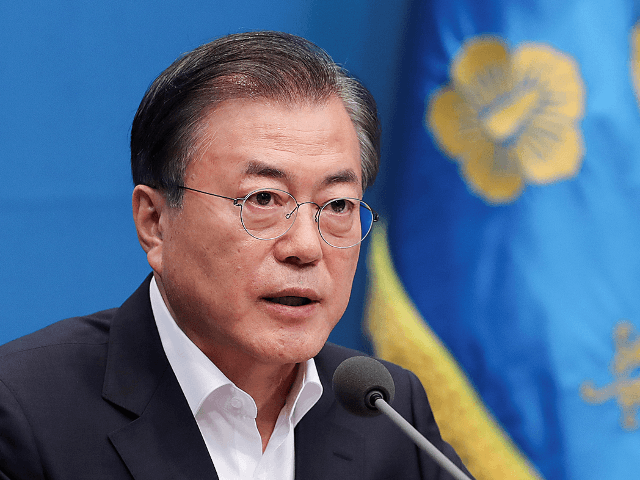Thursday was the 74th annual Liberation Day in South Korea, commemorating the end of Japanese occupation after World War II, and featured demonstrations denouncing both Japanese Prime Minister Abe Shinzo and South Korean President Moon Jae-in at a time of heightened tensions between the two countries.
The anti-Moon demonstrators, described by the Korea Times as “ultra-right” and “hateful” extremists who “seem to be going too far in their bashing of President Moon,” were generally displeased with Moon for being too soft on Japan and North Korea, although the lady who showed up at a rally carrying a sign that literally said “Kill Moon to Save Korea” actually thought Moon was jeopardizing South Korea’s future by being too tough with Tokyo:
Joo Ok-soon, leader of a conservative civic group known as “platoon of moms,” was also in on the action.
Currently under fire for a series of pro-Japanese comments amid tensions between Korea and Japan, she wielded a placard reading “Kill Moon to save Korea.” She also livestreamed the rally on YouTube.
Korea and Japan are at diplomatic odds due to Japan’s tightened export controls in retaliation for the Korean Supreme Court’s rulings last year ordering Japanese companies to compensate surviving South Korean victims of wartime forced labor. Amid growing anti-Japan sentiment, Joo has apologized to Japanese Prime Minister Shinzo Abe for Korea worsening bilateral tensions.
Joo also claimed that Japan’s colonial rule of Korea was behind Korea’s strong economy because of implementing Japan’s advanced technology. She also emphasized that the tensions between the countries would only harm Korea.
Other demonstrators built on the idea of “killing” Moon by driving him out of office with a petition, generally on the grounds that he is too willing to let Japan off the hook for its World War II atrocities and the recent aggressive actions it took against South Korea, or that Moon has grown too cozy with North Korea’s psychotic dictatorship. A few opposition politicians spoke at the rally and accused Moon of being dangerously sympathetic to North Korea’s communist ideology, if not secretly embracing it himself.
Other South Korean demonstrations expressed anger at Japan, often taking care to state their argument is with Prime Minister Abe and his administration rather than the Japanese people as a whole. Turnout for an anti-Abe demonstration in Seoul Plaza on Thursday reportedly exceeded 3,000 despite heavy rain.
Japanese civic groups critical of the Abe government participated in some of these events, along with Japanese students who said the history of forced labor and the sexual slavery of “comfort women” is not taught properly in their schools.
“The Korean government asked for dialogue, but Japanese government is dragging a trade issue into this, showing a behavior that does not makes sense and an attitude that is abnormal,” said Yoshikazu Odagawa, president of Japan’s National Confederation of Trade Unions, during a rally appearance.
A rally in central Seoul featured 88-year-old Yang Geum-deok, who was forced to work in a military factory during the Japanese occupation, and said it was important for Japan’s current government to fully take responsibility for its wartime treatment of Korea.
“My only wish is to hear one word of apology from Abe,” said Yang. “The world now knows what kind of suffering we experienced in Japan during those years. Let us all unite in condemning the Abe government.”
The demonstrators condemned Abe’s government for imposing restrictions on South Korean trade, and accusing the South Koreans of violating sanctions against North Korea, in retaliation for a South Korean Supreme Court decision last year that Japanese companies could be held accountable for using forced labor and forced to pay compensation to victims and their families. The Japanese accused South Korea of reneging on agreements that were supposed to settle the forced labor issue for good.
South Korean boycotts of Japanese goods continued throughout July, with significant declines in sales of Japanese beer and automobiles. Japanese beer lost its position as South Korea’s favorite import for the first time since 2009. Credit-card data revealed a remarkable 51 percent drop in South Korean spending on Japanese products.

COMMENTS
Please let us know if you're having issues with commenting.